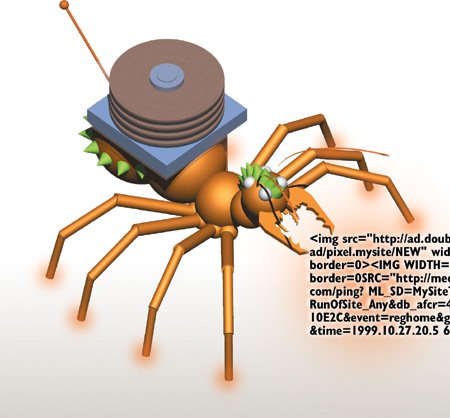Chapter 48. How Internet Sites Can Invade Your Privacy
| Privacy issues are a big concern on the Net. Much information can be gathered about people when they use the Net, and it's not always clear who will use that information or how it will be used. In particular, three technologies that concern people are cookies, web tracking, and web bugs. Cookies and web tracking both serve useful purposes, but many people worry that there is a "Big Brother" aspect to them. Web bugs, on the other hand, can be used for nefarious purposes. One technology, Internet passports, might enable people to ensure that their privacy isn't invaded while still enabling websites to gather information that can be used to deliver specialized services to web surfers. Cookies are bits of data put on a hard disk when someone visits certain websites. The most common use of this data is to make it easier for people to use websites that require a username and password. The cookie on the hard disk has the username and password in it, so people don't have to log in to every page that requires that information. Instead, the cookie sends the information to the server, and the person can visit the page freely. Cookies can contain virtually any kind of information, such as the last time a person visited the site, the person's favorite sites, and similar, customizable information. They can be used to track people as they go through a website and to help gain statistics about what types of pages people like to visit. Although some people view them as invaders of privacy, they can also make the Web a much better place to visit by doing things such as making it easier to conduct electronic commerce. Although cookies can be used to track how people use a website, many other methods can be used, as well. In one method, web server logs are examined in detail. This would make it possible, for example, to identify the most popular pages on the site, the sites people have just visited, how many pages people read in a typical visit, and similar information. Other methods include using software sniffers that examine every packet coming into or going out of a website. Webmasters can use this tracking information to help create better sitesbut they can also use it to assemble demographic information to sell to advertisers. The second illustration in this chapter shows the functionality of web tracking software from a company called Accrue. Web bugs can also trace people's paths through a website. Web bugs get their name not in reference to an error in a program, but instead from the term to bug as in "to wiretap." More dangerously, web bugs can be included in email, and they can actually enable people to view some of your email, as you'll see in the illustration later in this chapter. To allay people's privacy concerns, a variety of technologies and standards are being developed. They include the Platform for Privacy Preferences (P3P), the Internet Content and Exchange standard (ICE), and the Open Profiling Standard (OPS). Generically, we'll call these Internet passports. These Internet passports let people control which information about themselves they'll allow to be released to websitesand how that information can be used. And passports let people control what type of information can be gathered about their surfing and how that information can be used, as well. In general, the more information that people allow to be gathered about themselves, the more specialized services they'll gain on the Web, such as customized news feeds. Another privacy concern is posed by spyware, software that watches your surfing activities without you knowing about it, reports on them, and then delivers targeted ads to you, based on your activity. Spyware typically is installed on your computer when you install a piece of free software, such as the file-sharing software. |
EAN: 2147483647
Pages: 223
